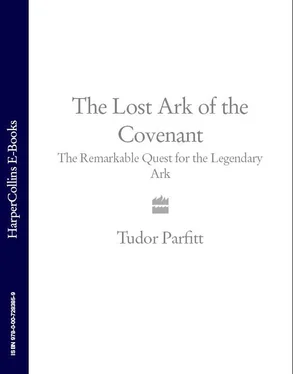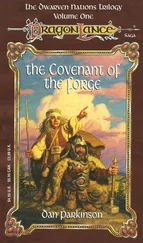1 ...8 9 10 12 13 14 ...19 In spite of himself, I could see that Rabin was enjoying the conversation. Over my protests, he paid for our tea, took my elbow in a firm grip, and ushered me across the bustling Rehavia street to the apartment where he lived.
In his book-lined study, he took out a dusty volume from a shabby wooden cupboard. ‘You know the Hebrew word for cupboard?’
‘Of course,’ I said. ‘ Aron .’
‘That’s right. Aron means chest or cupboard, anything that stores things. It is a very simple word, nothing very fancy or spiritual about it. It is the same word we use for the Ark - aron ha-brit - Chest of the Covenant. In English, “Ark” - which ultimately comes from the Latin arca - sounds, how would one say it, rather romantic or mysterious, does it not? In Hebrew it’s just a good old word for “chest” or, even more prosaically, “box”.’
‘Could it have any other meaning?’ I asked. ‘Is it connected with cognate words in other Semitic languages?’ As I asked the question the word ngoma flitted briefly through my mind but I dismissed it instantly. There was no connection between Semitic languages and Bantu languages that I knew of.
‘The cognate word means coffin in Phoenician and second millennium Akkadian, and could be a wooden box in first millennium Akkadian if I remember correctly.’
‘The meaning “coffin” seems a long way from the dwelling place of the living God,’ I remarked. ‘On the face of it, it even seems a little absurd.’
‘I don’t know,’ he said, wrinkling his nose, in the charming way he had. ‘No I think we can be fairly sure that in the classical Hebrew of the Jewish Scriptures the word means what it appears to mean, which is to say, well, yes, something like coffin - it does actually and literally mean coffin once or twice in the Bible - but more generally box or chest. Now where could that good old box be? What clues do we have?’ he asked with a boyish smile.
He told me that in the writing of the Jewish Sages and even in the Bible there were a number of clues as to the Ark’s whereabouts. In early rabbinic works, for instance, it was thought that King Josiah, who came to the throne of Israel in around 639 BC - the precise date is debatable - hid it somewhere in the Temple under the instructions of the Prophetess Huldah. This was probably the standard Jewish belief over time. The Sages wrote that the Ark was hidden ‘in its place’. This presumably meant somewhere in the Temple. Specifically it is suggested that it was buried under the floor of the part of the Temple where the wood used for sacrificial fires was stored.
‘Putting aside political problems, is the Temple where you would search if you were looking for it?’
‘If I were looking for it, I would always start with texts. That’s what I always advise my students: Go to the text . There’s more to be found in dusty old tomes than people imagine. In this case, I think, the text of the Dead Sea Scrolls could provide us with some enlightenment.’
The story of the discovery of these remarkable documents started on a rugged Palestinian hillside in 1947, as the violent conflict between Jews and Arabs in Palestine grew out of control and the British, who had governed Palestine for the previous twenty years, were preparing to pack their bags for good. A lean, unkempt Bedouin goatherd was searching the rocky hills along the Dead Sea for a lost goat. He threw a stone into a cave. Instead of the bleating of a frightened animal, he heard the unmistakable sound of breaking pottery.
Further investigation revealed a number of terracotta jars filled with manuscripts. Seven of these manuscripts were sold to a Jerusalem antique dealer and cobbler called Kando, who in turn - and at some profit - sold them to clients in the Holy City: three to a scholar at the Hebrew University and four to the Metropolitan of the Orthodox Monastery of St Mark.
Between 1947 and 1956, a total of more than 800 manuscripts or parts of manuscripts were found in 11 different caves.
Once the press found out about them, the scrolls became a sensation. What would they reveal about the origins of Christianity, the person of Jesus and the authenticity of the Bible? Scholars soon established a collective view that the Jewish Essene sect, which lived in this desolate place but about which very little was known, had hidden the scrolls as the Roman army was advancing towards them in search of Jews involved in the First Jewish Revolt (AD 66-70) against the Empire.
One of the most remarkable finds was the Copper Scroll. Discovered in the third of the Qumran caves to yield its treasures, this scroll records a list of 64 underground hiding places of valuable items: gold, silver, aromatics like frankincense and myrrh, and manuscripts. Initially a number of scholars refused to believe that this list of lost treasure was genuine. Some thought it was no more than a kind of literary collection of lost-treasure stories. I asked Rabin about it.
He shrugged. ‘The Copper Scroll was a bit of an embarrassment. Look at this.’ He reached for a file in the bookcase behind him and took out a yellowing clipping. ‘This is what the New York Times wrote when the scroll was first published: “It sounds like something that might have been written in blood in the dark of the moon by a character in Treasure Island .”’ Rabin laughed. ‘But just because it was embarrassing does not mean it was not true . Of course it was not prudent to advertise the scroll too much we had to avoid a gold rush. But a lot of what was said at the time by the scholars involved - Milik, Mowinckel, Silberman, even de Vaux - was off the mark. I think I can say that I was successful in putting them right,’ he murmured with mild, scholarly satisfaction. ‘ Their idea was that this was a kind of joke perpetrated by a semi-literate scribe - a crank. Now, a sort of hoax about a fabulous but non-existent Temple treasure clumsily scratched on a copper plate by a dirtpoor ascetic in a filthy goat-ridden cave in the desert would have been potentially amusing, would it not? But I fear my Israelite ancestors were not noted for their sense of humour! No?
‘No, I believe that the Copper Scroll is what it appears to be - a verbatim protocol of the priests’ evidence. It is a priestly document from Jerusalem, I am sure of it. A listing of the secret hiding places of the Temple treasure. That’s all it is - a list - there is no colourful prose, not even any verbs. It is dry as a bone! Problem is,’ he continued, ‘that the descriptions of the hiding places are meaningless. Take these clues for instance.’
He looked up a passage in the book he had reached down from his shelves and started to read. ‘One of the hoards consisting of 65 bars of gold was hidden in “the cavity of the Old House of Tribute in the Platform of the Chain.”’
He looked at me with a quizzical expression on his face.
‘And how about this? This pile of goodies is listed as being “in the gutter which is in the bottom of the water tank”. Or this treasure trove carefully concealed “in the Second Enclosure, in the underground passage that looks east”. Or this priceless collection “in the water conduit of the northern reservoir”. I ask you! Jerusalem postmen are noted for their skill at tracking down addresses written in all the languages and scripts of the world,’ he said, chuckling, ‘but with addresses like this, even they would have to give up! For our generation they are quite meaningless. As for the specific treasure of the sanctuary, I fear the information is no less vague.’
‘Do you think that these phrases could be codes?’
‘It has occurred to me. But, on balance, my sense of the document is that it is prosaically what it seems to be. A list of addresses which sadly are no longer meaningful.’
Читать дальше












